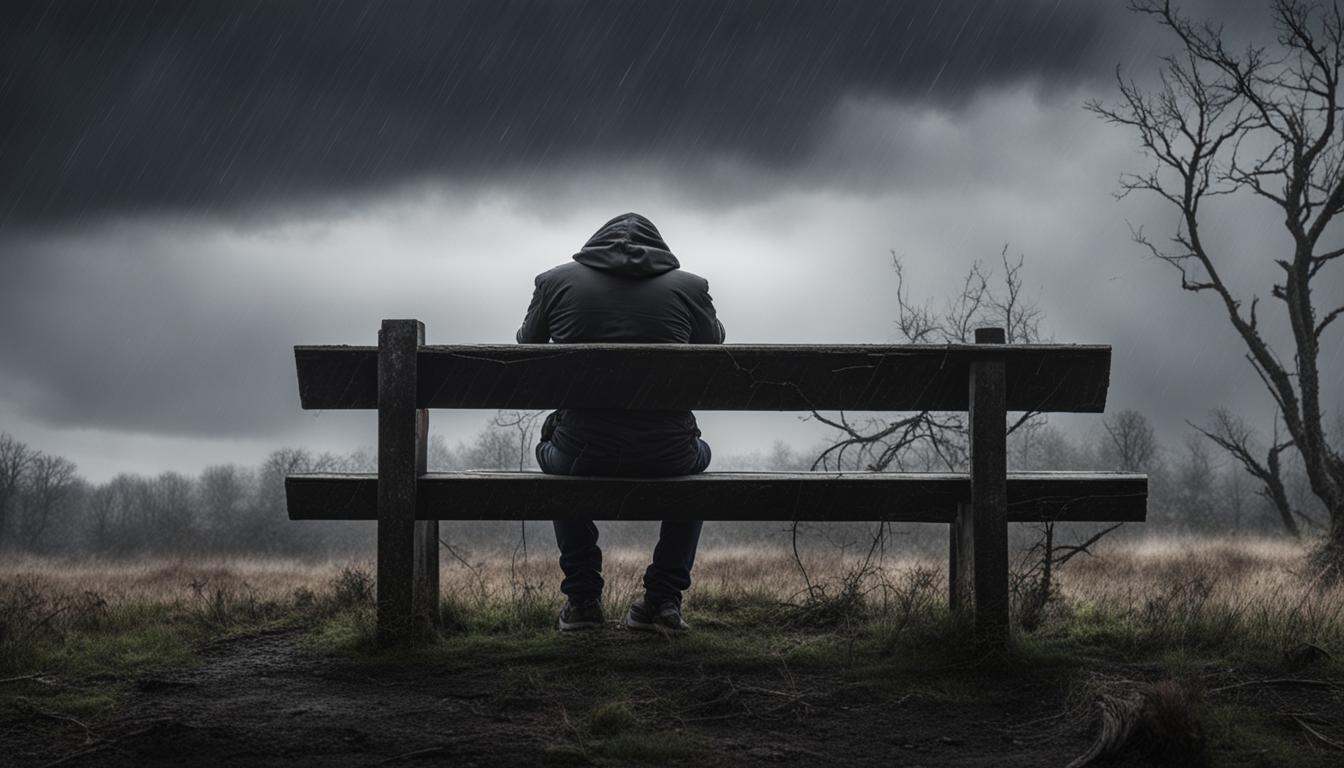Relationship burnout can be emotionally draining and exhausting. It occurs when a romantic relationship becomes toxic, unhealthy, and full of conflicts. It is important to understand the signs of relationship burnout and take steps to renew and restore the connection.
Key Takeaways:
- Recognize the signs of relationship burnout in order to address the issue.
- Communicate openly and honestly with your partner to rebuild the connection.
- Seek therapy or professional help if needed to overcome burnout.
- Prioritize self-care and self-reflection as part of the recovery process.
- Prevent relationship burnout by actively working on maintaining a healthy relationship.
What does it mean to be in an emotionally draining relationship?
An emotionally draining relationship is a situation where partners feel mentally and emotionally exhausted. It goes beyond the normal challenges that couples face and becomes a constant source of negativity and stress. In such relationships, there is a lack of support, healthy communication, and emotional balance. Instead, partners may experience constant criticism, arguments, and a general feeling of being drained.

Partners in an emotionally draining relationship often feel insecure, frustrated, and unfulfilled. They may find themselves constantly questioning their worth and walking on eggshells to avoid conflict. The negativity and lack of support can take a toll on their mental and emotional well-being.
To overcome the challenges of an emotionally draining relationship, it is important to recognize the signs and seek solutions. This may involve open and honest communication, setting boundaries, and seeking professional help if necessary. By addressing the underlying issues and working towards a healthier dynamic, partners can begin to rebuild their connection and find a more fulfilling relationship.
Signs of an Emotionally Draining Partner in a Relationship
An emotionally draining partner can have a significant impact on the overall health and happiness of a relationship. It is important to recognize the signs of emotional drain in a partner to address the underlying issues and work towards building a healthier connection. Here are some common signs to watch out for:
- Lack of healthy communication: Your partner may avoid open and honest communication, shutting down important discussions or dismissing your feelings.
- Irresponsibility: An emotionally draining partner may consistently neglect their responsibilities, such as not fulfilling their share of household chores or financial obligations.
- Excessive insecurity: Your partner may constantly doubt themselves and seek reassurance, leading to a cycle of neediness and draining your emotional energy.
- Belittling behavior: If your partner consistently puts you down, criticizes your choices, or undermines your self-esteem, they are emotionally draining.
- Craving alone time: While it is healthy for each partner to have individual space, an emotionally draining partner may constantly isolate themselves, avoiding quality time together.
- Lack of support: Your partner may be unsupportive of your goals, dreams, and achievements, making you feel invalidated and emotionally drained.
- Frequent mood swings: Emotional instability, with rapid shifts in mood and behavior, can be draining for both partners.
- Unjustified drama: An emotionally draining partner may create unnecessary drama or escalate minor conflicts, contributing to emotional exhaustion.
- Playing the victim: Your partner may constantly portray themselves as the victim in conflicts, refusing to take responsibility for their actions.
- Constant negativity: Negativity and pessimism can be draining, with your partner always focusing on the negative aspects of life and the relationship.
Recognizing these signs is crucial in understanding and addressing relationship burnout. If you find that your partner exhibits several of these behaviors, it may be necessary to seek support from a therapist or counselor to navigate the challenges and work towards a healthier, more fulfilling relationship.
Quote:
“Being in a relationship with an emotionally draining partner can take a toll on your mental health and well-being. It is important to prioritize self-care and set boundaries to protect yourself from emotional exhaustion.” – Relationship Expert

Causes of Relationship Burnout
Relationship burnout can be a result of various factors that contribute to emotional exhaustion and dissatisfaction. Understanding these causes is crucial in addressing and preventing burnout in relationships.
One of the main causes of relationship burnout is complacency. Over time, couples may become too comfortable in their relationship, leading to a lack of effort and investment. This complacency can result in decreased excitement and passion, ultimately leading to burnout.
Periods of excessive stress can also contribute to relationship burnout. External pressures such as work, financial difficulties, or family issues can take a toll on a relationship, causing partners to feel overwhelmed and emotionally drained.
Furthermore, mismatched energy levels in a relationship can lead to burnout. When one partner is consistently putting in more effort and energy than the other, feelings of resentment and exhaustion can arise. This imbalance can create significant challenges in maintaining a healthy and fulfilling connection.
It is important for couples to recognize these underlying causes of relationship burnout and actively work on addressing them. By prioritizing communication, addressing stressors, and fostering a sense of balance in the relationship, partners can prevent and overcome burnout, ultimately renewing their connection.

How to Overcome Burnout in a Relationship
Recovering from relationship burnout requires a concerted effort from both partners. By implementing certain strategies, couples can rebuild their connection and foster a healthier relationship. Here are some steps to help you overcome burnout in a relationship:
- Improve communication: Open and honest communication is vital for rebuilding trust and understanding. Make an effort to actively listen to your partner’s perspectives and concerns, and express your own thoughts and feelings in a respectful manner. Clear and effective communication can help resolve conflicts and strengthen your bond.
- Address underlying issues: Take the time to identify any underlying issues that may have contributed to the burnout. This could include unresolved conflicts, unmet needs, or unhealthy patterns of behavior. Seeking the help of a therapist or counselor can provide a safe space to explore these issues and gain valuable insights into your relationship dynamics.
- Prioritize self-care: Taking care of your own well-being is crucial when recovering from burnout. Make self-care a priority by engaging in activities that bring you joy and recharge your energy. This could include exercise, pursuing hobbies, practicing mindfulness, or spending time with supportive friends and family.
Rebuilding a connection after burnout requires time, patience, and a commitment to personal and relationship growth. Remember that each relationship is unique, and what works for one couple may not work for another. Be willing to adapt and make adjustments along the way as you navigate the process of rebuilding your connection.

Rebuilding Relationship Connection
Rebuilding the connection in a relationship is a multifaceted process. Here are a few additional strategies that can help you reconnect with your partner:
- Create new shared experiences: Engage in activities together that you both enjoy and that promote a sense of closeness and bonding. This could be as simple as trying out a new hobby, going on a weekend getaway, or cooking a meal together.
- Show appreciation and gratitude: Expressing appreciation for your partner’s efforts and qualities can foster a positive atmosphere in the relationship. Take the time to acknowledge and celebrate each other’s strengths and contributions.
- Reignite the spark: Find ways to reignite the romance and passion in your relationship. This could involve planning date nights, surprising each other with thoughtful gestures, or exploring new ways to express intimacy and affection.
Recovering from burnout in a relationship is a challenging yet rewarding journey. With commitment, effort, and a willingness to learn and grow, couples can overcome burnout and build a stronger, more resilient connection.
Preventing Relationship Disenchantment
In order to prevent relationship burnout and maintain a healthy partnership, couples should be proactive in nurturing and preserving their connection. By recognizing the signs of burnout and taking preventive measures, couples can avoid the negative effects of relationship disenchantment. Here are some strategies to help prevent burnout and foster a healthy relationship:
- Broaden your perspective: Avoid getting caught up in old patterns or becoming too focused on the negatives. Take a step back and try to see the bigger picture, appreciating the positive aspects of your partner and the relationship.
- Nurture the relationship: Make time for each other and prioritize your bond. Engage in activities together that bring joy and strengthen your connection. Regularly express love and appreciation for one another.
- Recognize the impact of stress: Life can be stressful, and it can take a toll on relationships. Be mindful of external stressors and actively work together to manage them. Support each other during challenging times.
- Foster open communication: Healthy communication is key to preventing burnout. Create a safe space for open and honest dialogue. Listen to each other without judgment and express your thoughts and feelings in a respectful manner.
Remember, prevention is better than cure. By being proactive in maintaining a healthy relationship, you can avoid relationship burnout and create a lasting, fulfilling partnership.
It’s important to note that every relationship is unique, and what works for one couple may not work for another. However, by implementing these strategies and staying attuned to each other’s needs, you can take significant steps towards preventing relationship burnout and cultivating a strong, loving bond.

Additional Resources:
- The Importance of Self-Care in Maintaining a Healthy Relationship
- Building Trust and Intimacy in Your Relationship
The Warning Signs of Relationship Disenchantment
Recognizing the warning signs of relationship disenchantment is crucial in addressing the underlying issues and preventing further deterioration of the connection. These signs serve as early indicators that the relationship may be heading towards burnout and unhappiness. By paying attention to these warning signs, couples can take proactive steps to address the issues and work towards renewing their bond.
Here are some common warning signs of burnout in relationships:
- A narrow focus on old patterns: When both partners constantly dwell on past mistakes and constantly bring up unresolved issues, it can hinder the growth and progress of the relationship.
- Low energy and lack of motivation: If you or your partner consistently feel drained and lack motivation to invest in the relationship, it may indicate a deeper dissatisfaction.
- A desire to escape: Feeling a strong urge to distance yourself from the relationship or fantasizing about a life without your partner can be a sign of discontentment.
- Blame and guilt: Couples experiencing burnout often engage in blame games and harbor feelings of guilt, which can create a toxic environment.
- Loss of hope: When hope and optimism for the future of the relationship diminish, it becomes crucial to address the underlying issues and seek solutions.
Recognizing these warning signs is the first step towards preventing relationship burnout. By acknowledging the presence of these signs, couples can take the necessary steps to address the root causes and work towards rebuilding a stronger, happier bond.

Recognizing Signs of Relationship Exhaustion
Relationship burnout can manifest in various ways, and recognizing the signs is crucial in addressing and overcoming the challenges that come with it. When you’re tired of your relationship, certain indicators may suggest that you’re experiencing relationship exhaustion.
One sign to watch out for is becoming disinterested in your partner’s quirks and habits. This can mean losing the desire to engage in activities you once enjoyed together or feeling indifferent towards their presence. Additionally, avoiding discussions about problems and the future may indicate a lack of investment in the relationship.
Another sign of relationship burnout is a decline in sexual attraction. If you find yourself feeling less physically attracted to your partner or experiencing a decrease in sexual intimacy, it could be a red flag. Lastly, not wanting to spend time together and preferring to be alone or with others can be a sign of emotional exhaustion and the need for space.
Recognizing Relationship Burnout
It is important to differentiate between general life stressors and actual relationship burnout. By paying attention to these signs, you can gain insight into the state of your relationship and take appropriate action. Recognizing relationship burnout is the first step towards finding solutions and working towards renewal and growth.
“When you’re tired of your relationship, it’s important to reflect on the underlying causes and consider whether the relationship can be salvaged with open communication and effort from both partners.”
- Disinterest in partner’s quirks and habits
- Avoiding discussions about problems and the future
- Decline in sexual attraction
- Preference for alone time or time with others
Recognizing these signs can help guide your decisions about the future of your relationship and whether seeking outside help, such as couples therapy, is necessary. Remember, relationship burnout doesn’t have to be the end. With awareness, effort, and a commitment to growth, it’s possible to rebuild and strengthen your connection.

Not all hope is lost: What’s next for a relationship burnout?
When faced with relationship burnout, it’s important to remember that breaking up is not the only solution. Many couples have successfully repaired their relationships and renewed their connections after experiencing burnout. The key is for both partners to be willing to make an effort and take the necessary steps to rebuild trust, improve communication, and rekindle the love that brought them together.
In the process of repairing a burnout relationship, couples may find it beneficial to seek couples therapy. A trained therapist can help facilitate conversations, provide guidance, and offer practical tools to address the underlying issues contributing to the burnout. Through therapy, couples can gain a better understanding of each other’s needs, learn effective communication techniques, and develop strategies to navigate challenges and conflicts.
Deciding to stay or leave a relationship is a deeply personal choice that requires careful consideration. It’s essential for individuals to assess their own happiness and well-being, as well as the potential for growth and positive change within the relationship. Seeking support from trusted friends, family, or professionals can provide valuable perspectives and guidance during this decision-making process.
“Repairing a burnout relationship requires commitment, patience, and a willingness to work through the issues together. It’s a journey that requires both partners to take responsibility for their actions and actively participate in the healing process.”
Key Takeaways:
- Repairing a burnout relationship is possible if both partners are willing to make an effort.
- Couples therapy can provide valuable support and guidance in the process of repairing a burnout relationship.
- Deciding to stay or leave a relationship should be a carefully considered decision, with an emphasis on individual happiness and growth.

The Take-Away
Relationship burnout is a real and challenging issue that can have a significant impact on our mental health and overall well-being. It is important to recognize the signs of burnout and understand the underlying causes in order to effectively overcome it.
One crucial step towards renewing a connection in a burned-out relationship is improving communication. Open and honest dialogue allows partners to express their needs, concerns, and desires, fostering a deeper understanding and empathy for each other. It is through effective communication that couples can begin to rebuild trust and intimacy.
Prioritizing self-care is another key aspect of overcoming emotional exhaustion in a relationship. Taking time for oneself and engaging in activities that bring joy and fulfillment can help recharge and rejuvenate. Additionally, seeking therapy or professional guidance can provide valuable tools and strategies for managing burnout and rebuilding the relationship.
Strategies for renewing the connection and overcoming relationship burnout include:
- Engaging in open and honest communication
- Prioritizing self-care and personal well-being
- Seeking therapy or professional guidance
- Investing time and effort in rebuilding trust and intimacy
“It takes two committed and willing partners to overcome relationship burnout. By recognizing the signs, taking proactive steps, and seeking support, couples can renew their connection and create a healthier, more fulfilling partnership.”
Overcoming relationship burnout is an ongoing process that requires dedication, effort, and a commitment to growth. By implementing these strategies and seeking the necessary support, couples can navigate the challenges of burnout and emerge with a renewed sense of connection and love.

Conclusion
Overcoming burnout in relationships is a challenging but achievable task. By acknowledging the signs of burnout, understanding its causes, and taking proactive steps, couples can renew their connection and create a healthier and more fulfilling partnership.
It requires effort from both partners to improve communication, address underlying issues, and prioritize self-care. Seeking therapy or counseling can provide valuable support and guidance in navigating the complexities of relationship burnout. By committing to self-reflection and growth, couples can overcome burnout and rebuild a stronger bond.
Remember, relationship burnout is not insurmountable. With dedication and the right support, couples can overcome the challenges they face, renew their connection, and create a happier, more fulfilling relationship.
FAQ
What is relationship burnout?
Relationship burnout occurs when a romantic relationship becomes toxic, unhealthy, and full of conflicts, leading to emotional exhaustion and feelings of dissatisfaction.
What are the signs of an emotionally draining relationship?
Signs of an emotionally draining relationship include a lack of support, constant negativity, a lack of healthy communication, excessive insecurity, feelings of frustration, and a lack of healthy communication.
How can I recognize an emotionally draining partner in a relationship?
Signs of an emotionally draining partner in a relationship include a lack of healthy communication, irresponsibility, excessive insecurity, belittling behavior, craving alone time, lack of support, frequent mood swings, unjustified drama, playing the victim, and constant negativity.
What causes relationship burnout?
Relationship burnout can be caused by factors such as complacency, periods of excessive stress, and mismatched energy in the relationship, which can lead to a decline in excitement and satisfaction.
How can I overcome burnout in a relationship?
Overcoming burnout in a relationship requires effort and dedication from both partners. It involves improving communication skills, addressing underlying issues, and working on rebuilding the connection through open and honest communication, seeking therapy if needed, and prioritizing self-care and self-reflection.
How can I prevent relationship burnout?
To prevent relationship burnout, couples should be aware of early warning signs and actively work on maintaining a healthy relationship. This includes broadening their perspective, nurturing the relationship, recognizing the impact of stress, and fostering open communication.
What are the warning signs of relationship disenchantment?
Warning signs of relationship disenchantment include a narrow focus on old patterns, low energy and lack of motivation, a desire to escape, blame and guilt, and loss of hope.
How do I know if I’m tired of my relationship?
Signs that indicate being tired of a relationship include becoming disinterested in your partner’s quirks and habits, avoiding talking about problems, not wanting to spend time together, a decline in sexual attraction, and avoiding discussions about the future.
What can I do if I’m experiencing relationship burnout?
When facing relationship burnout, it is important to consider the next steps. Breaking up is not the only solution, and couples can work on repairing the relationship if both partners are willing to make an effort. This may involve seeking couples therapy, improving communication, and finding new ways to connect with each other.
Is relationship burnout preventable?
While relationship burnout is a common challenge, it is not insurmountable. By recognizing the signs, understanding the causes, and taking proactive steps to address the underlying issues, couples can overcome burnout and renew their connection.
How can I renew my relationship connection and overcome burnout?
Renewing a relationship connection and overcoming burnout requires effort, communication, and a commitment to self-care and relationship growth. It involves improving communication, addressing underlying issues, and prioritizing self-care to create a stronger and healthier bond.


